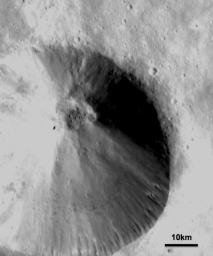
|
Boulders on Vesta
- Click the image above for a larger view
- Full-Res JPEG (562 x 676) (37.2 kB)
- Full-Res TIFF (562 x 676) (380.5 kB)
Caption:
This detail of a Dawn FC (framing camera) image shows a fresh scarp rimmed crater with many boulders on the crater floor. These boulders have diameters of 100-200m, which is roughly the size of many asteroids! Also evident in this image are linear mass movement features, which originate from the rim of the crater (bottom of image) and are due to material slumping towards the center of the crater. There are also many smaller, and presumably younger, impact craters on the walls of this crater.
NASA's Dawn spacecraft obtained this image with its framing camera on September 20th 2011. This image was taken through the camera's clear filter. The distance to the surface of Vesta is 670km and the image resolution is about 63 meters per pixel.
Background Info:
The Dawn mission to Vesta and Ceres is managed by NASA's Jet Propulsion Laboratory, a division of the California Institute of Technology, Pasadena, Calif., for NASA's Science Mission Directorate, Washington. UCLA is responsible for overall Dawn mission science. The Dawn framing cameras were developed and built under the leadership of the Max Planck Institute for Solar System Research, Katlenburg-Lindau, Germany, with significant contributions by DLR German Aerospace Center, Institute of Planetary Research, Berlin, and in coordination with the Institute of Computer and Communication Network Engineering, Braunschweig. The Framing Camera project is funded by the Max Planck Society, DLR, and NASA/JPL.
More information about Dawn is online at http://www.nasa.gov/dawn and http://dawn.jpl.nasa.gov .
Cataloging Keywords:
| Name | Value | Additional Values |
|---|---|---|
| Target | 4 Vesta | |
| System | Main Belt | |
| Target Type | Asteroid | |
| Mission | Dawn | |
| Instrument Host | Dawn | |
| Host Type | Orbiter | |
| Instrument | Framing Camera (FC) | |
| Detector | ||
| Extra Keywords | Crater, Grayscale, Impact | |
| Acquisition Date | ||
| Release Date | 2011-10-12 | |
| Date in Caption | ||
| Image Credit | NASA/JPL-Caltech/UCLA/MPS/DLR/IDA | |
| Source | photojournal.jpl.nasa.gov/catalog/PIA14892 | |
| Identifier | PIA14892 | |
